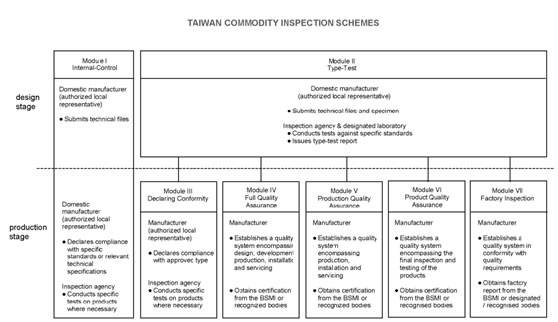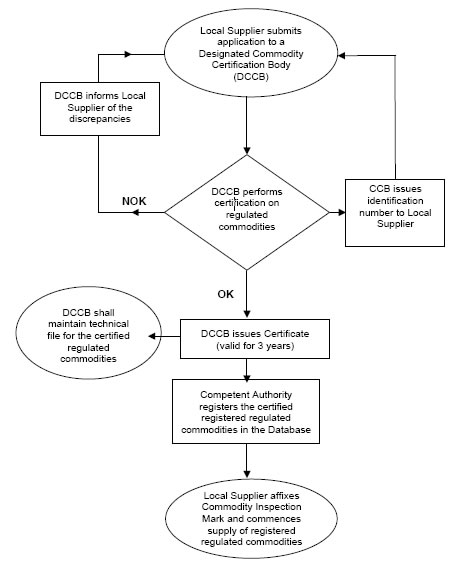Cerpass Group is a BSMI Designated EMC and Safety Testing Lab. It’s accreditation extends to its Donguan site. By helping to reduce the time, effort and costs for ITE, AV, Radio & TV, household appliancesmanufacturers that requires Safety and EMC accreditation to enter Taiwan Market, Cerpass is your best choice.
The Bureau of Standards, Metrology and Inspection (BSMI) under the Ministry of Economic Affairs is the authority responsible for standardization, metrology and product inspection in Taiwan. Inspection of Electrical and Electronic (EE) commodities is conducted according to three Schemes, namely: batch-by-batch inspection, registration of product certification(RPC), and declaration of conformity(DoC).
On-line Search for products subject to Regulatory Inspection:
http://civil.bsmi.gov.tw/bsmi_pqn/index.jsp?lang=en
Taiwan Commodity InspectionChecklist
Logo/Scheme

For commodities subject to
Registration of Product Certification Scheme

For commodities subject to Declaration of Conformity(DoC) Scheme,

For commodities subject to type-approved Batch Inspection
Property
EMC and Safety Approval
Factory Inspection
Module VII under RPC Scheme requires factory inspection.
NO
NO
Regulated Products and its Standards
ITE: CNS 14336-1 & CNS13438
Radio & TV: CNS14408 & CNS13439.
Household Applicances: CNS3765, IEC60335 & CNS13783-1
Lamps: CNS14335 , IEC60598 & CNS14115
Other: CNS61558, IEC61347….
Basic Application Documents
- Registration document of the business
- BSMI Application Form
- ISO Certificate or Factory Inspection Report ( module II&III according to RPC Scheme need not submit)
- Deviation description (For Series Application use)
- Block diagrams & PCB Layout
- Critical components list Certificate and spec
- Chinese Label and Chinese User’s manual
- Transformer and Choke.
- Colour Photographs of product appearance and important internal construction or components
- Power Line BSMI CNS Certificate
- Power random operation needs to provide complete CB Report 或RPC Certificate
For Modification ( includes Standard Change, factory address change, etc…), extension and series application, original certificate should be provided.
Local Test
BSMI Designated Testing Laboratory(Local or Foreign)
Certificate Validity
RPC & Type-Approval is valid for three years, to renewable for another three years before certificate is expired
Registration of Product Certification
Instead of going through the complicated and time-consuming batch-by-batch inspection procedures, the local suppliers are encouraged to adopt the registration of product certification (RPC) scheme. Check the applicable standards and conformity assessment procedures for the regulated commodities to select which module selectable under the RPC scheme. Seven modules are designed to take into account the different characteristics of products or product sectors in meeting the regulatory requirements.
Brief description of modules under the Registration of Product Certification System:
(1) Module I (internal-control):
This module applies to products of simple design with less safety concerns. The manufacturer or the authorized local representative (if the manufacturer is located abroad) shall file an application for registration together with a declaration of conformity indicating compliance of the product concerned with specified standards or technical specifications.
(2) Module II (type-test):
This module generally applies to products of fixed construction and mass production. The manufacturer or the authorized local representative shall apply to the designated body together with a specimen of the product concerned for the conduction of necessary tests against specified standards or technical specifications. Where the specimen meets relevant requirements, the designated body shall issue a type-test report to the applicant. This module has to be used in combination with other modules.
(3) Module III (conformity-to-type declaration):
a declaration of conformity to type shall be drawn up by the manufacturer or the authorized local representative, declaring that the products concerned comply with the type as described in the type-test report.
(4) Module IV (full quality assurance):
the manufacturer must establish a quality system that is in compliance with CNS 12680 (ISO 9000) series of standards and certified by the BSMI or its recognized certification bodies via appropriate assessments.
(5) Module V (production quality assurance):
the manufacturer must establish a quality system that is in compliance with CNS 12680 (ISO 9000) series of standards and certified by the BSMI or its recognized certification bodies via appropriate assessments.
(6) Module VI (product quality assurance):
the manufacturers must establish a quality system that is in compliance with CNS 12680 (ISO 9000) series of standards and certified by the BSMI or its recognized certification bodies via appropriate assessment activities.
(7) Module VII (simplified quality assurance):
this module is specifically designed to suit the needs of small-sized manufacturers, mainly home-based and unique to our society in the course of economic development, where only minimum quality elements are required to ensure the compliance of the products with relevant requirements. The BSMI will also identify the quality elements with which the manufacturer must comply when this module is designated. Assessment shall be conducted by the BSMI.
Among the above modules, Module I can be applied alone while Modules III, IV, V, VI, VII must be applied in combination with Module II respectively.

FLOW-CHART FOR REGISTRATION / CERTIFICATION OF REGULATED ODITIES UNDER RPC SCHEME

Declaration of Conformity
The DoC announced by the BSMI to be applicable to certain products allows the manufacturer to have the testing done by laboratories on his choice from laboratories designated by the BSMI, to prepare the technical documents on his own, and to draw up the declaration declaring the conformity of his products with relevant standards. These products are placed under market surveillance conducted by the BSMI. This post-market control approach, instead of pre-market control or border control, will save time and cost for the manufacturer comparing to those required for product approval or registration. Products that are allowed to apply the DoC procedure may be imported without being blocked by the customs for inspection
Copyright © Cerpass Group All rights reserved.